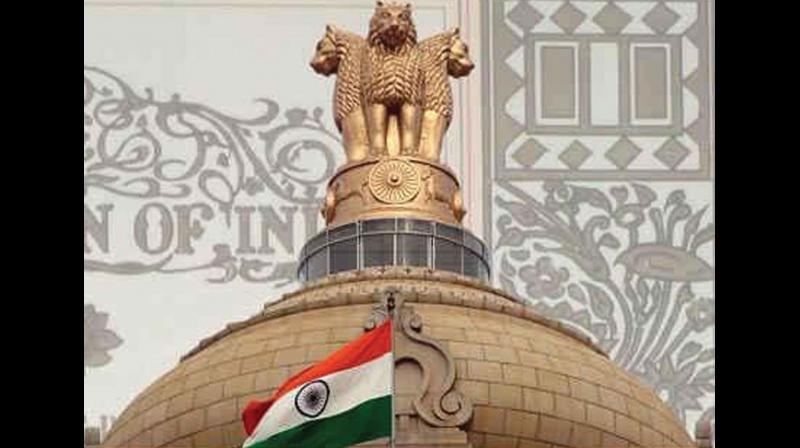National language and the Hindi hegemony

Hindi happens to be the fourth most spoken language in the world, with an estimated 500 million speakers across the globe. It has been influenced and enriched by Dravidian, Turkish, Farsi, Arabic, Portugese and English.
A brief history
Hindi is a direct descendent of Sanskrit. It started to emerge as Apabhramsha in the 7th century and by the 10 century became stable. Standard Hindi is based on the Khariboli dialect of the Delhi region.
Is Hindi a national language?
In the Constitution, Hindi was declared as an official language and not a national language. Under Article 343, official language of the Union has been prescribed, which includes Hindi in Devanagari script and English. While Hindi remains the most spoken mother tongue in the country, nearly 60 per cent Indians speak a language other than Hindi.
When did Hindi become the official language of India?
The Constitution, in 1950, declared Hindi in Devanagari script to be the official language of the Union, as well as English. Parliamentary business, according to the Constitution, may be conducted in either Hindi or English. The use of English in parliamentary proceedings was to be phased out at the end of 15 years unless Parliament chose to extend its use, which Parliament did through the Official Languages Act, 1963. However, the states have the liberty and powers to specify their own official language(s) through legislation and, therefore, there are 22 officially recognised languages in India.
Imposition of Hindi as national language
The indoctrination that Hindi is the national language is widespread. Despite there being no mention of it in the Constitution, and despite clarifications by the judiciary, the assertion that Hindi has national language status continues unabated.
Attempts to make Hindi a national language
Plans to set Hindi as a national language began in the making of the Indian Constitution. However, acknowledging that most of the country did not know Hindi, our Constitution-makers decided to promulgate Hindi as an official language on the grounds that it was the single largest spoken language in India. After the 15 year period, the government under PM Lal Bahadhur Shashtri made it mandatory for communication between the Centre and the states to be in Hindi. Further Hindi was taught in schools thus it gave the impression that Hindi was all set to become the national language. This led to a series of conflicts in different regions of India, especially in Tamil Nadu. Sixty-six people died — two of which were members of the DMK.
Argument to make Hindi national language
There are numerous arguments that moot for declaring Hindi as the national language. First is the claim that it imbibes a sense of unity and gives a sense of nationalism. Another argument came from none other than Mahatma Gandhi. In his book India of My Dreams, he strongly advocates for Hindustani (Hindi in the Devanagari script) which was a resultant of the Hindi and Urdu languages.
Efforts to spread Hindi
Various steps have been taken by the Indian government to implement the use and familiarisation of Hindi extensively. Dakshina Bharat Hindi Prachar Sabha in Chennai was formed in 1918 to spread Hindi in South Indian states. Regional Hindi implementation offices at Bengaluru, Mumbai, Kolkata, Guwahati, Bhopal, Delhi Thiruvananthapuram and Ghaziabad have been established to monitor the implementation of Hindi in Central government offices and PSUs. In 2014, the Union home ministry had ordered all bureaucrats to prioritise Hindi over English on official accounts on social media platforms such as Twitter and Facebook. Another circular announced prize money of '2,000 to two employees who do their official work mostly in Hindi. '1,200 and '600 will be given to the second and third position holders respectively.
Recent controversies
A recent approval by the President to make Hindi compulsory in CBSE schools and KVs has created a furore with most non-Hindi speaking states accusing the Centre of suppressing other native languages. In April 2017, Assamese singer Zubeen Garg was stopped midway from singing a Hindi song at Rongali Bihu.
After BJP’s sweep in recent Uttar Pradesh elections, Protem Speaker Fateh Bahadur administered the oath of office to 319 of the 403 legislators. Thirteen BJP members chose to take oath in Sanskrit, while two SP MLAs from Azamgarh — Nafees Ahmad and Alambadi — chose to take oath in Urdu. However, Bahadur invalidated Ahmad’s oath, and made him retake his oath in Hindi. Under UP Vidhan Sabha rules, a legislator is allowed to take oath of the House in Hindi and Sanskrit, but not in Urdu, the second official language of the state.

